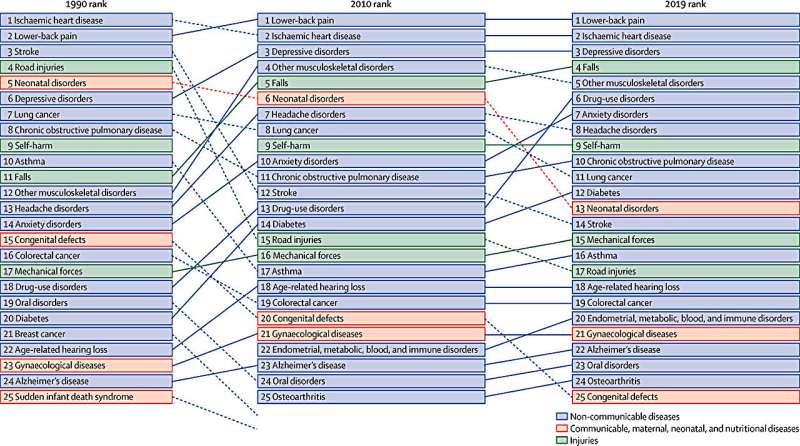This article has been reviewed according to Science X's editorial process and policies. Editors have highlighted the following attributes while ensuring the content's credibility:
fact-checked
peer-reviewed publication
trusted source
proofread
Australians living longer, but dementia and Alzheimer's are a greater risk: Study

A new analysis of Australia's disease burden reveals Australians are living six years longer than they were 30 years ago, but more people are being diagnosed with Alzheimer's disease and dementia.
Life expectancy at birth in Australia was 77 years in 1990 and had risen to 82.9 years by 2019 according to the data published in The Lancet Public Health, which also compared the burden of disease in Australia with 14 similar high socio-demographic (SDI) countries over the same period.
Associate Professor Shariful Islam from Deakin University's Institute for Physical Activity and Nutrition (IPAN) said the results revealed some positive health outcomes but also highlighted areas where improvement is needed.
"Australia ranks better for diabetes and stroke than many of the countries in our study, but several diseases, including chronic diseases and diseases in older age groups, as well as risk factors and injuries are worse," Associate Professor Islam said.
"For example, Australia ranks poorly for anxiety and depressive disorders as well as Alzheimer's disease, dementia and falls among the elderly.
"This tells us that despite Australia's strong health care system we need to do better with our primary prevention and health promotion strategies."
The study represents the most extensive analysis of disease burden in Australia using standardized and globally comparable metrics developed by the Global Burden of Disease.
The comprehensive assessment of premature death, morbidity and disability, and the risk factors contributing to poor health in the Australian population analyzed 286 causes of death, 369 diseases and injuries, and 87 behavioral, metabolic, and environmental and occupational risks.
Associate Professor Islam said estimates of disease burden in Australia provide valuable evidence to guide population health policies and health care priorities.
"As life expectancy at birth continues to increase, functional health loss associated with aging, such as low back pain, ischemic heart disease, depressive disorders, falls, and musculoskeletal disorders, continue to contribute to the largest burden of disease in Australia," Associate Professor Islam said.
"The leading cause of deaths in Australia were ischemic heart disease, stroke, tracheal, bronchus, and lung cancer, Alzheimer's disease and other dementias and chronic obstructive pulmonary disease.
"Poor mental health, drug use disorders, as well as self-harm and interpersonal violence are among the emerging health issues in Australia.
"Preventive and remedial health policies and practices addressing these issues as well as chronic diseases and risk factors are needed to ensure the sustainability of the Australian health care system."
More information: The burden and trend of diseases and their risk factors in Australia, 1990–2019: a systematic analysis for the Global Burden of Disease Study 2019, The Lancet Public Health (2023). DOI: 10.1016/S2468-2667(23)00123-8





















